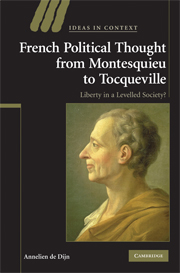Book contents
- Frontmatter
- Contents
- Acknowledgements
- Introduction
- 1 Political thought in eighteenth-century France: the invention of aristocratic liberalism
- 2 Liberty and inequality: the royalist discourse
- 3 A society of equals: the liberal response
- 4 Liberty in a levelled society: Charles Dunoyer, Benjamin Constant, and Prosper de Barante
- 5 The new aristocracy: a theme in Restoration liberalism
- 6 The danger of democracy: Orléanist liberalism and Alexis de Tocqueville
- 7 The French predicament: aristocratic liberalism in the Second Empire
- Epilogue
- Bibliography
- Index
- IDEAS IN CONTEXT
1 - Political thought in eighteenth-century France: the invention of aristocratic liberalism
Published online by Cambridge University Press: 22 September 2009
- Frontmatter
- Contents
- Acknowledgements
- Introduction
- 1 Political thought in eighteenth-century France: the invention of aristocratic liberalism
- 2 Liberty and inequality: the royalist discourse
- 3 A society of equals: the liberal response
- 4 Liberty in a levelled society: Charles Dunoyer, Benjamin Constant, and Prosper de Barante
- 5 The new aristocracy: a theme in Restoration liberalism
- 6 The danger of democracy: Orléanist liberalism and Alexis de Tocqueville
- 7 The French predicament: aristocratic liberalism in the Second Empire
- Epilogue
- Bibliography
- Index
- IDEAS IN CONTEXT
Summary
CLASSICAL REPUBLICANISM IN EIGHTEENTH-CENTURY FRANCE
Over the past few decades, our knowledge of eighteenth-century political thought has increased exponentially. We now know that the paradigm of classical republicanism, which had its origins in Renaissance Italy, was one of the most important political languages in early-modern Europe. Influential republican thinkers such as Nicolo Machiavelli or James Harrington were not necessarily opposed to a hereditary monarchy. But, inspired by their admiration for the city-states of antiquity, they argued that, in order to be free, one had to pose the law unto oneself. To be under someone else's dominion, republicans believed, was to be unfree by definition, even if the sovereign did not actually abuse his power. Liberty, therefore, required an active commitment and participation of each citizen in public affairs. This conception of liberty had an important implication. It meant that liberty depended on a particular moral condition in the citizenry. Public spiritedness, the ability to put the general interest before one's own – described as civic virtue – was indispensable to sustain such active participation. Selfishness and apathy posed a constant threat to the preservation of liberty.
In addition to its political and moral requirements, the republican identification of liberty with self-government also presupposed a specific social ideal. Many republican thinkers were convinced that liberty could not be maintained in a society with considerable inequality in wealth.
- Type
- Chapter
- Information
- French Political Thought from Montesquieu to TocquevilleLiberty in a Levelled Society?, pp. 11 - 39Publisher: Cambridge University PressPrint publication year: 2008



